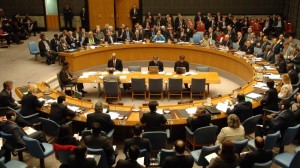 United Nations Security Council in session (file photo)[/caption]
United Nations Security Council in session (file photo)[/caption]UNITED NATIONS (AP) -- The U.N. General Assembly elected Jordan to the Security Council on Friday to replace Saudi Arabia, which had rejected the seat in an unprecedented act to protest the council's failure to end the Syrian and Israeli-Palestinian conflicts.
Arab countries chose Jordan as a replacement, and Asian nations endorsed it to take the traditional Arab seat on the U.N.'s most powerful body. It received 178 "yes" votes in the election.
Saudi Arabia got one vote, and four countries in the 193-member world body abstained. The 10 other countries were either absent or unable to vote because of unpaid dues.
Jordan's Foreign Minister Nasser Judeh said the country was "extremely honored" and "humbled" by the near consensus support from the international community, which recognized "Jordan's relentless efforts in the pursuit of peace and security, the very principles that the Security Council is mandated to preserve."
Saudi Arabia stunned the diplomatic world by rejecting the Security Council seat less than 24 hours after it was elected on Oct. 17.
The Saudi Foreign Ministry denounced the Security Council's inability to resolve the Syrian civil war and Israeli-Palestinian conflict and to convene a conference on creating a Mideast zone free of weapons of mass destruction. Saudi Arabia also was upset about the warming U.S.-Iran relationship, seeing Tehran as its main rival in the region.
Asked whether Jordan agreed that the Security Council was dysfunctional, Judeh said, "Saudi Arabia declined to take the seat for its sovereign reasons."
"These are reasons that we respect. This is their independent decision," he said.
The Security Council has five permanent members with veto power - the U.S., Russia, China, Britain and France - and 10 elected members who serve two-year terms.
Since joining the world body in 1955, Jordan has held the council seat twice before. It will join four other newcomers to the council on Jan. 1 - Chad, Nigeria, Lithuania and Chile.
By The Associated Press
The Iran Project is not responsible for the content of quoted articles.










